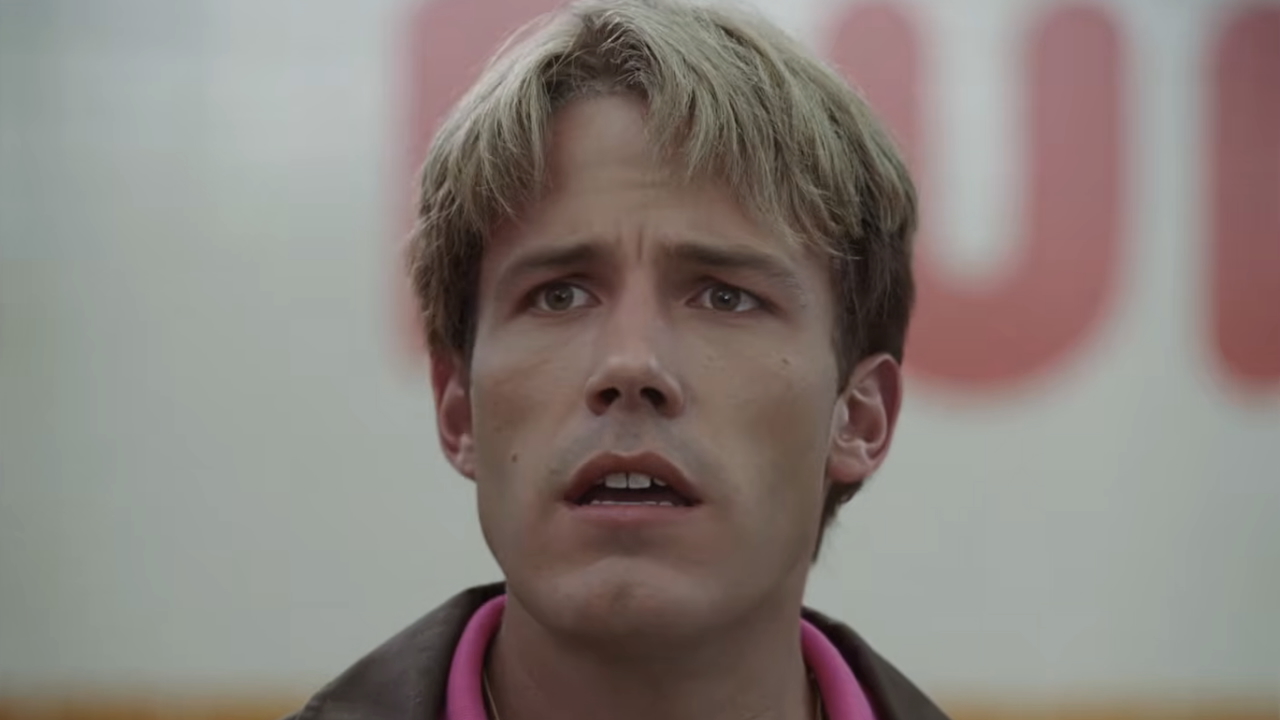Sex, Drugs And Homework: Anatomy Of A Teen Raunch Comedy
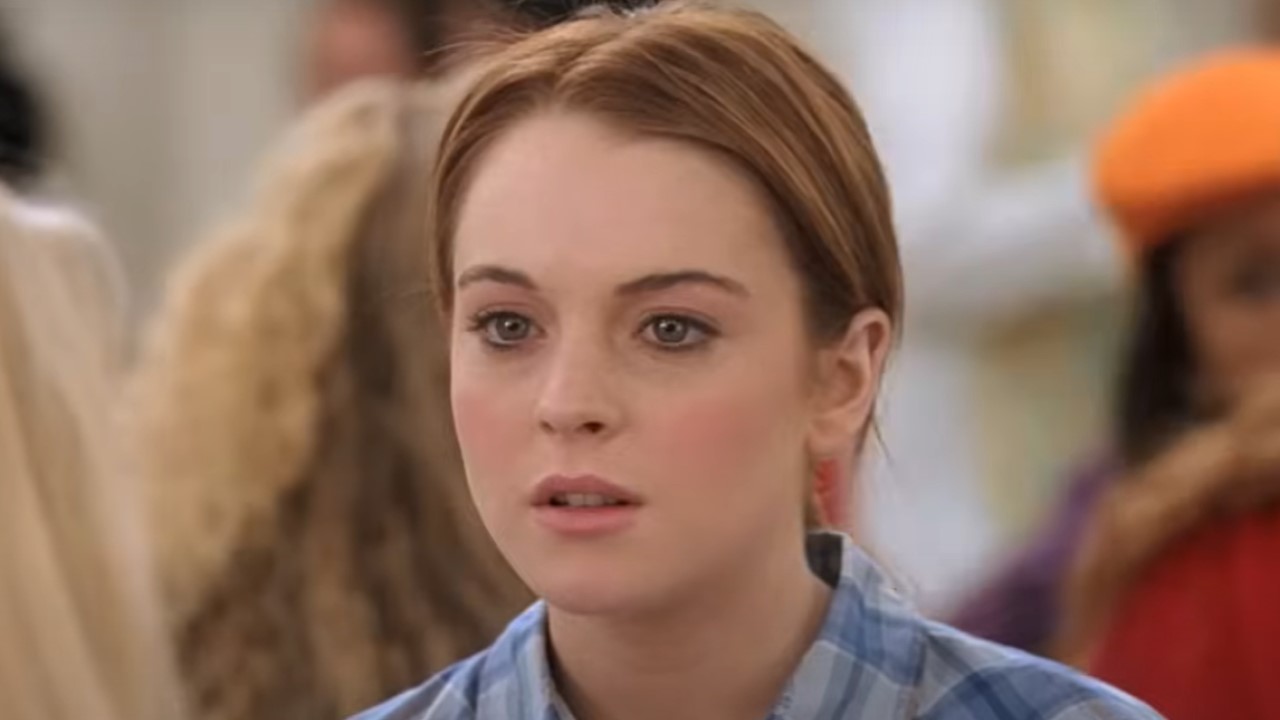
Your Daily Blend of Entertainment News
You are now subscribed
Your newsletter sign-up was successful

This month the teen raunch comedy genre returned to theaters with a reality-like twist when the Will Ferrell produced faux documentary The Virginity Hit began rolling out in limited release on September 10th. The assumption for most moviegoers buying a ticket, is that teenage raunch comedies like The Virginity Hit, are about growing up. In a way, that's true, but more specifically, they're about pretending to grow up. Adolescence is a giant race to see who can age the quickest. Since there's not really a scientific way to do that, teenagers gravitate towards things that can be overtly defined as adult, and more importantly, they begin seeing the world in black-and-white, us-vs-them ideologies. Either he's like us or he's apart from us, either she's a prude or she's a slut, either he's always down to party or he's a narc who'd probably tell his mom. That's why every teen comedy of note contains hyper-specific heroes and villains or at least, a specifically defined objective. It's Lambda Lambda Lambda vs the Jocks, it's a race to see who can lose their virginity first, it's a run to the liquor store to try and buy beer with a fake id.
All of this is frequently derided as stupid and cliché-ridden, of course, but what is high school, if not stupid and cliché-ridden? Everyone I know has an awkward virginity loss story, just as everyone I know has a first time they drank story. From boobs to blunts to bromances, high school is almost obnoxious in its obviousness, and while the names and outfits will change over time, the stupid, sophomoric longings inside the hearts of seventeen year old boys will never die. When I was a freshman in high school, some dumbass at one of the neighboring high schools was suspended two weeks for crawling through the school's air ducts to see into the girls' locker room. Porky's, a 1981 comedy film set in 1954, is famously simplified in retrospect to be about spying into the girl's locker room. Revenge Of The Nerds, a 1984 teen raunch comedy set in 1984, has an entire plotline devoted to figuring out the technology it would take to spy into a sorority house. Fifty years from now, young boys will be desperately trying to creep on naked girls, and if future teen raunch comedies don't depict that, they'll feel hollow.
Don't get me wrong, all this talk of repetition is not to imply the teenage raunch comedy is destined to be stagnant, it's just destined to constantly re-evaluate and re-interpret the same ideas. Just as the majority of sports movies will, in some part, always be about winning the big game, teenage raunch comedies, in some capacity, will always be about the same themes of rebellion, growing up and budding sexuality. Weird Science explores many of the same ideas as Superbad, but its overall plot and ways of conveying the same longings to feel accepted by women are unique to the movies themselves.
So, what is a teenage raunch comedy? Well, that's impossible to say, except that, they all involve teenagers behaving in a somewhat lurid manner. They're frequently R-Rated, but not necessarily R-Rated, and they all share at least several of the themes or elements described below. Do they have to contain underage drinking? No. They also don't need to contain promiscuity, swearing or anti-authoritarian behavior, but it certainly does help. Here's a look at the 5 most common teenage raunch comedy staples, as alternately depicted between two different movies…
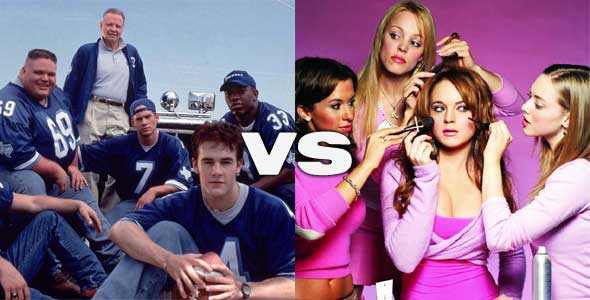
Binge Drinking: Varsity Blues (1999) Vs Mean Girls (2004)
Drinking, unlike drug use, is so fundamental to the high school experience that the difference between people is less whether they did or didn't and more at what age did they started. Released just five years apart, Varsity Blues and Mean Girls depict underage drinking in sharply different ways. In the former, the police officers, at least until their car is stolen, along with many of the parents see binge drinking as a good ol boy part of growing up. They tolerate it, along with a bit of carousing, as a natural part of growing up. Don't go to the hospital and be ready for practice in the morning used to be the mantra, but Mean Girls, in many ways a more modern depiction of society, is far less tolerant.Parents, police officers and even many teenagers themselves now see drinking as a serious risk with irate parents and possible community service as consequences. As a result, poor Lindsey Lohan isn't even able to enjoy the party she throws because she's so paranoid about her parents finding out. In both movies, someone vomits, epically. One is into a washing machine. It's good-naturedly laughed off. The other is in front of a potential suitor. It has real reprecussions. It's fairly obvious which is which, just as it's fairly obvious the glory days of 200 person unbusted high school parties were scared off by incessant CNN stories about alcohol poisoning.
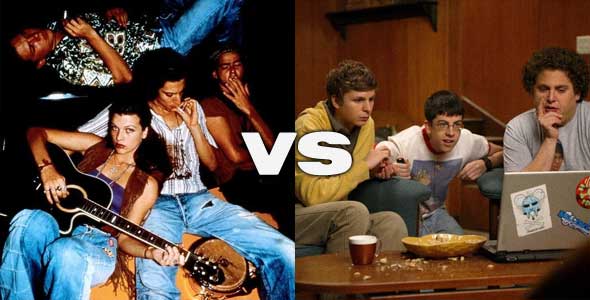
Centralized Locations: Dazed And Confused (1993-Set In 1976) vs Superbad (2007)
When you turn sixteen years old, there's a new-found freedom that almost overwhelms you. Even if you don't personally have a car, it's very likely one of your friends has a car, and this lack of reliance on your parents and working around their schedules is beyond awesome. You can drive to the movies, leave the house at the drop of hat, go multiple places in one night. It's incredible, until you turn seventeen and realize you've already been all the places you wanted to go. And there's two years of this until college. As much as things change, they stay the same.Superbad and Dazed And Confused are set more than thirty years apart, but hanging over all of their characters is this annoying, mundane realization that even though it's the weekend, there's like six places in the entire town to go. That's why nearly every non-road trip teenage raunch comedy has a very small number of location changes. You don't bar hop when you're seventeen, you don't say fuck it and drive to Vegas, you go to the pool hall or you hope someone's parents are going out of town. It should be noted, however, that the characters in Superbad are able to explain where the party is at via cell phone while the poor bastards in Dazed And Confused have to congregate at the local drive-in to explain where the party's gonna be at. God, I love technology.
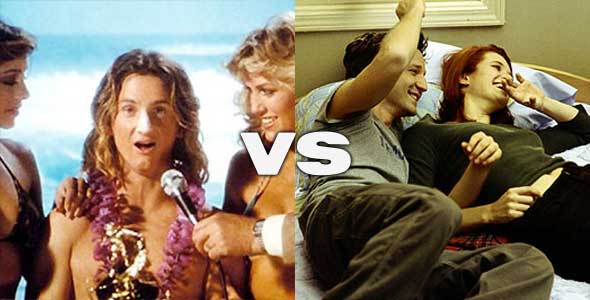
Grades: Fast Times At Ridgemont High (1982) vs Road Trip (2000)
Your Daily Blend of Entertainment News
For the last ten years or so, the idea of grade inflation has been at the forefront of most educational debates. Are we doing C-students a disservice by giving them A-minuses? Are we putting them in a position to succeed by letting them into better colleges or are we marking them for potential failure by setting them up for academically tough situations they won't be able to handle? It's very much a twenty-first century issue, but in some ways, it's a rudimentary problem teachers have been struggling with since 1982. That's the year Mr. Hand decided to show up at Jeff Spicolli's house to impart just enough knowledge that he might slide by and pass US History. Don't tell me passing Jeff Spicolli wasn't grade inflation. There's no way that mouth breather knows a thing about US History, but honestly, passing him was probably the right decision. A kid like that doesn't need to know who Jefferson Davis was to work at a 7-11, just as Josh doesn't need Ancient Philosophy to do whatever it is he's gonna do with his life in Road Trip.Where people once worried about just passing high school, now they're worried about just passing college. And movies are starting to reflect that. Just a few years ago, we had a film about kids stealing the SAT. That would have been ludicrous thirty years ago, but now that desperation to do well in high school is applicable enough that we could have a movie about kids planning to steal the test. College is the new high school. And Jeff Spicolli, well, there will never be another Jeff Spicolli.
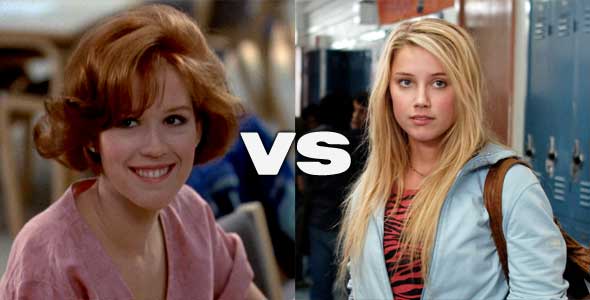
Drug Use: The Breakfast Club (1985) Vs Pineapple Express (2008)
I know what you're thinking. Why is Pineapple Express on this list? All the main characters in that movie have to be at least twenty-five. Yes, but I don't want to talk about them. I want to talk about Dale's teenage girlfriend Angie. Early on in the movie, Saul asks Dale if she smokes pot, and he says, “Yeah, well, sort of, as much as any high schooler smokes pot.” Now compare that to the shock and awe the characters in The Breakfast Club experience when they find out Bender has pot on him. Movies have long shown so-called stoner characters, but these kids have overtly been potheads to the point where pot has defined them. Not so anymore.Increasingly, high school kids are smoking pot every once in a while, without marijuana becoming their distinct personality trait. Movies, for the most part, have yet to start reflecting this trend, but it's coming. Sometimes teenagers just smoke pot. It isn't always their first time and it's not always a recurrent thing, it just happens. The teenage raunch comedies of tomorrow will have characters like this because, I suspect, many future filmmakers will have graduated high school with a dozen or so smokes under their belt. They'll make movies to depict their experiences, and those memories will be a lot closer to Angie's than Princess Claire's.

Losing Your Virginity: American Pie (1999) vs Saved! (2004)
I would argue there's no more clear dividing line amongst teenagers than between those who have had sex and those who haven't. It's a striking contrast just as clear today as it was fifty years ago. Losing your virginity makes you re-evaluate yourself in ways drinking or swearing never could. Probably because there's no going back. It's not when or how you lose it that's important, it's why you lose it, and that, unlike many of the other things on this list, will always be true. The whole point of American Pie is losing your virginity as a goal unto itself, the whole point of Saved! is losing your virginity because, in that moment, it felt like the right thing to do.Fifty years from now, when they're making raunch comedies about losing your virginity, there will still be a dividing line between the characters who saw virginity as a weight around their necks to discard and those who saw it as a token to be given away at a time of their choosing. It doesn't matter if the average teenager starts having sex at seventeen or sixteen or even fifteen. Some will give it out of obligation and some will give it for something. It's not a social critique, it's just a fact, and as much as our ideals about grades, drugs and drinking will evolve, the virginity dichotomy will never change.
Mack Rawden is the Editor-In-Chief of CinemaBlend. He first started working at the publication as a writer back in 2007 and has held various jobs at the site in the time since including Managing Editor, Pop Culture Editor and Staff Writer. He now splits his time between working on CinemaBlend’s user experience, helping to plan the site’s editorial direction and writing passionate articles about niche entertainment topics he’s into. He graduated from Indiana University with a degree in English (go Hoosiers!) and has been interviewed and quoted in a variety of publications including Digiday. Enthusiastic about Clue, case-of-the-week mysteries, a great wrestling promo and cookies at Disney World. Less enthusiastic about the pricing structure of cable, loud noises and Tuesdays.
